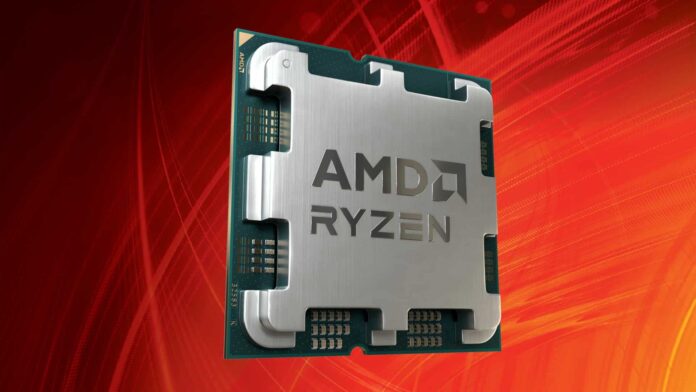The search for the cause led to an ordinary Windows update with unusual results.
It’s almost like a technical miracle: a Windows update is said to achieve double-digit percentage performance gains on almost all current Ryzen CPUs. How can that be?
The release of Ryzen 9000 was underwhelming
In order to properly classify the events of the past few weeks, we must first look back to the beginning of August.
On August 8, the Ryzen 5 9600X and Ryzen 7 9700X were launched on the market, followed a week later by the Ryzen 9 9900X and Ryzen 9 9950X.
AMD is committed to providing a high-quality experience to every Ryzen user. Please see below for updated information on retail availability of AMD Ryzen 9000 Series processors. https://t.co/MGDxVC3MEj
– AMD Ryzen (@AMDRyzen) July 24, 2024
In our test of the Ryzen 7 9700X, it also quickly became clear that the increase in performance was limited. In games in particular, AMD was to a certain extent tripping itself up – but in our eyes, this was primarily due to the 3D V-Cache of the X3D models.
A hidden admin account as a solution – or not?
Just a few days after these initial tests, it emerged that a Windows bug could potentially be to blame for Zen 5’s lack of a “real” performance boost. After all, the results to date have been significantly lower than stated by AMD.
Only a short time later, however, Hardware Unboxed had to do a backwards roll. The ominous Windows bug does not exist in this form.
Windows 11 24H2 with big jumps
Following feedback from reporting and the community, CPU manufacturer AMD explains in thecommunity blog that the expectations for Ryzen 9000 can be understood.
Various factors play a role in the discrepancy between the in-house benchmarks and the independent test reports:
- Among other things, the aforementioned administrator mode, which is used as standard in AMD’s own benchmarks, is also mentioned.
- The results from this test suite reflect “code optimizations for jump prediction that are not present in the Windows version used by reviewers”.
However, the update required for this optimization was still in the preview phase in the Windows Insider Program at the time and was only available for the 24H2 version.
- It is therefore understandable that only a few testers were actually able to determine the promised performance of Ryzen 9000.
- Our CPU tests also generally run on the latest and most stable Windows release.
The hardware tester KitGuru subsequently published benchmarks that confirm AMD’s claims.
The jump prediction as cause
At this point, let’s allow ourselves a brief digression: what is this ominous jump prediction that was probably the cause of the lack of performance?
- In simple terms:As a rule, each program instruction is processed by the CPU in sequence. At certain points, however, CPUs can also “jump” to another instruction.
- This is where branch prediction comes into play: Based on previous branch instructions, processors can to a certain extent “predict” when such an instruction is coming and what the target address is – hence the name “branch prediction”.
- This ensures that the CPUs are utilized as sensibly and constantly as possible, which increases both efficiency and general performance.
Obviously, the Ryzen CPUs had problems with branch prediction under all Windows 11 versions that are not based on 24H2.
Fresh update for 23H2 with similar effects
In the meantime, Microsoft has released KB5041587 for Windows 11 23H2. The developers have managed to port the optimization of the jump prediction back to the current OS version, a spokesperson told Ars Technica.
- As a result, a similar increase in performance can now also be expected under Windows 11 23H2 as in the previously tested Insider build. This statement was confirmed by the first benchmarks from Ars Technica itself.
- In principle, however, the performance boost is not exclusive to Zen 5. Some processors from previous AMD generations (Ryzen 7000 and even 5000) should also benefit from more performance thanks to the Windows update.
- Even Intel’s 13th and 14th generation CPUs should benefit from the optimized jump prediction – finally some positive news for the CPU competitor after the past weeks and months were rather adorned with negative headlines!
What does this mean for the valuation of Ryzen 9000?Since the optimization of the jump prediction applies to numerous CPUs outside of Zen 5, the original résumé for Ryzen 9000 changes little to nothing for the time being.
In relation to the direct predecessor, the gap is still quite small due to the general validity, and even too small in view of the significantly higher cost point.
However, there is hope for a completely different update that is supposedly in the works.
- Shortly after the release of the Ryzen 9000, rumors emerged that a BIOS update would increase the power consumption of the new CPUs from 65 to 105 watts.
- The freed-up power should in turn (albeit at the expense of efficiency) ensure that Zen 5 can actually significantly outperform Zen 4.
Now we need your opinion: Have you already downloaded the latest KB5041587 update and have you noticed a difference in performance? Let us know in the comments!


